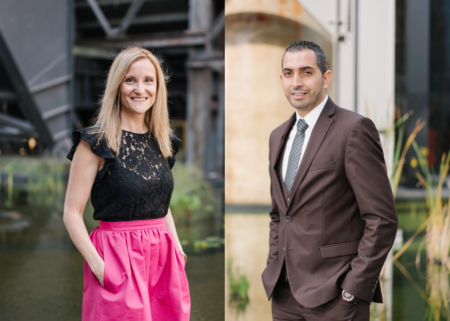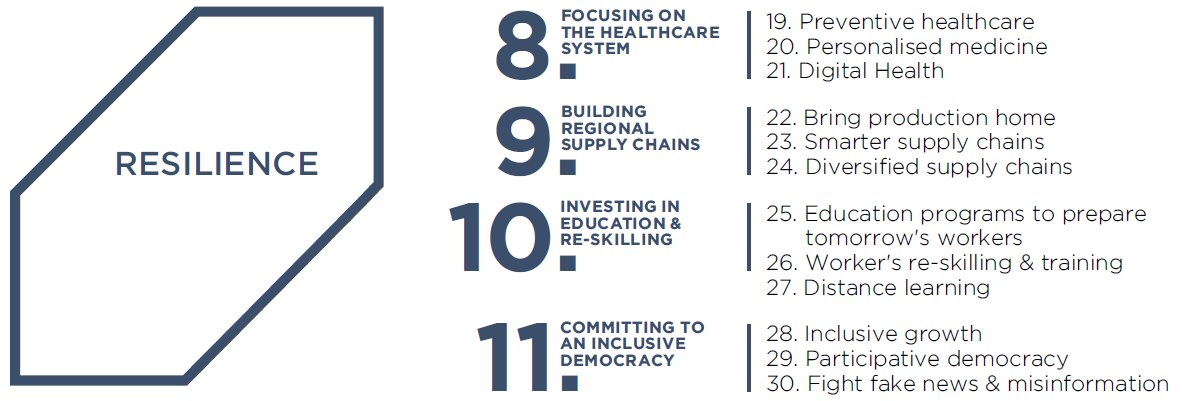What does “resilience” mean when we speak about it in economic and societal terms?
 Sara Bouchon: The expression originally comes from material science and refers to a material that can be deformed by applying pressure and then, once the pressure is gone, return to its original shape. However, when we speak about the economy and society, I prefer using the term as it is used in ecology. Let’s say that a new species of fish is introduced in a lake, for example. This disturbs the equilibrium of the ecosystem and provokes a crisis that will last until a new balance – which is different from the initial one – has been found. This is only possible if the ecosystem is both flexible and agile. The same goes for companies, economic systems and society as a whole.
Sara Bouchon: The expression originally comes from material science and refers to a material that can be deformed by applying pressure and then, once the pressure is gone, return to its original shape. However, when we speak about the economy and society, I prefer using the term as it is used in ecology. Let’s say that a new species of fish is introduced in a lake, for example. This disturbs the equilibrium of the ecosystem and provokes a crisis that will last until a new balance – which is different from the initial one – has been found. This is only possible if the ecosystem is both flexible and agile. The same goes for companies, economic systems and society as a whole.
Mohamed Toumi: Resilience, in this sense, is what makes us able to continue to produce, live and do what we usually do during and after a crisis. We might lose some of the things that we used to have, but we are still able to go forward.
One of the most obvious areas where more resilience is needed is perhaps in the healthcare system.
Mohamed Toumi: The current healthcare system has not been designed taking resilience into account, and as it is often stretched even in normal times, this major health crisis was a great challenge. In the future, I think that health systems will be remodelled and focus more on preventive healthcare to decrease the pressure on hospitals, healthcare workers and medical supplies.
Sara Bouchon: Digital technologies have an important role to play. Many countries turned to remote medical consultations, based on secure video links, during the lockdown. The increasing availability of personalised diagnostic systems and test devices also makes it possible for people to check their health without going to the doctor. Data analysis and artificial intelligence can be used to assess someone’s health status based on a number of indicators and help anticipate future health issues. When doing our study on major market trends after COVID-19, we found that the digital health market is expected to increase from an estimated $103.1 billion in 2019 to $385.8 billion in 2025.
Mohamed Toumi: At the same time, the increased use of digital health solutions challenges the regulatory framework and security levels. Health data is obviously very sensitive, and legal adaptations as well as new cybersecurity solutions may be needed.

Another topic that keeps coming back when we talk about the post COVID-19 economy is the fragility of global supply chains. Do you think that it is realistic to expect companies to establish national or regional supply chains in the future?
Sara Bouchon: I don’t think that all value chains either will or should be completely regional. But the crisis has shown the urgent need to design smarter, stronger and more diverse supply chains, not least in the healthcare field. We expect global companies to diversify their supply chains much more in the future and rely less on single-sourcing models driven exclusively by cost control. More firms will also decentralise their manufacturing capacity and look to bring some parts of their production home.
Mohamed Toumi: Digitalisation is very important here as well. Technologies such as artificial intelligence and the internet of things make it possible for supply chains to become smart and have a real-time view of all suppliers and their stocks. When regular suppliers face disruption, they can quickly switch to alternative providers.
What other actions do you expect to see to make society more resilient?
Sara Bouchon: Society is made up of people, and our personal resilience contributes to make society as a whole more or less resilient. During the coronavirus crisis, some business sectors suddenly were in urgent need of manpower while others had no work at all. This made it necessary for some people to be flexible and able to change tasks and missions very quickly. We think that this will have an important impact on education and vocational training in the future. Schools and universities might have to not only teach technical skills but also cross-functional knowledge that makes students better able to adapt to a changing work environment. The current workforce may also need to be “reskilled” in order to be able to take up new tasks within their organisations or even to change professions.
Mohamed Toumi: The way we learn will also change. When schools were shut all over the world, education changed dramatically and e-learning became crucial. Even before COVID-19, there was high growth in the field of education technology. The overall market for online education is now projected to reach $350 billion by 2025.
In your study, you also talk about resilience as being a democratic issue.
Sara Bouchon: Absolutely. The crisis has highlighted the need to rebuild more inclusive and democratic societies. We can see that it has hit people very differently depending on their economic situation, gender, type of work, and so on. Inclusive recovery strategies are essential for increasing our resilience.
Mohamed Toumi: The access to new technologies is a good example. Not all families have a computer for each person, which can be very challenging when the parents are working from home and the children have to attend their classes over the internet. This strongly accentuates inequalities. When distance learning becomes even more common than today, it is necessary to make sure that all students have the right conditions for joining and benefiting from the teaching.
Sara Bouchon: Another interesting case is the British parliament that continued to function via videoconferences and distance voting during the lockdown. Our study indicates that new “democracy tech” will emerge that will enable participative decision making involving the population. The crisis provided an opportunity to progress in this field.
Mohamed Toumi: However, this calls for the development of secure infrastructure for receiving feedback from the population, regardless of whether it is during a crisis or for a regular national referendum. This also highlights the need to educate people so that they can make the difference between official information and less validated statements. The fight against fake news is more important than ever.

